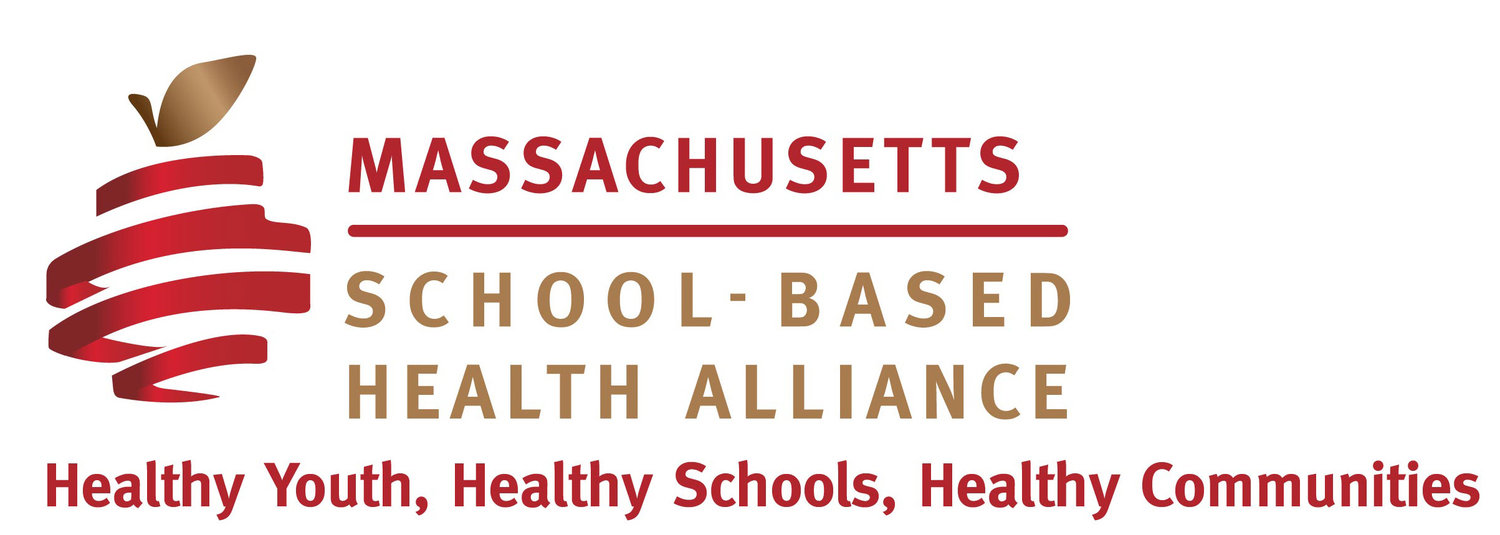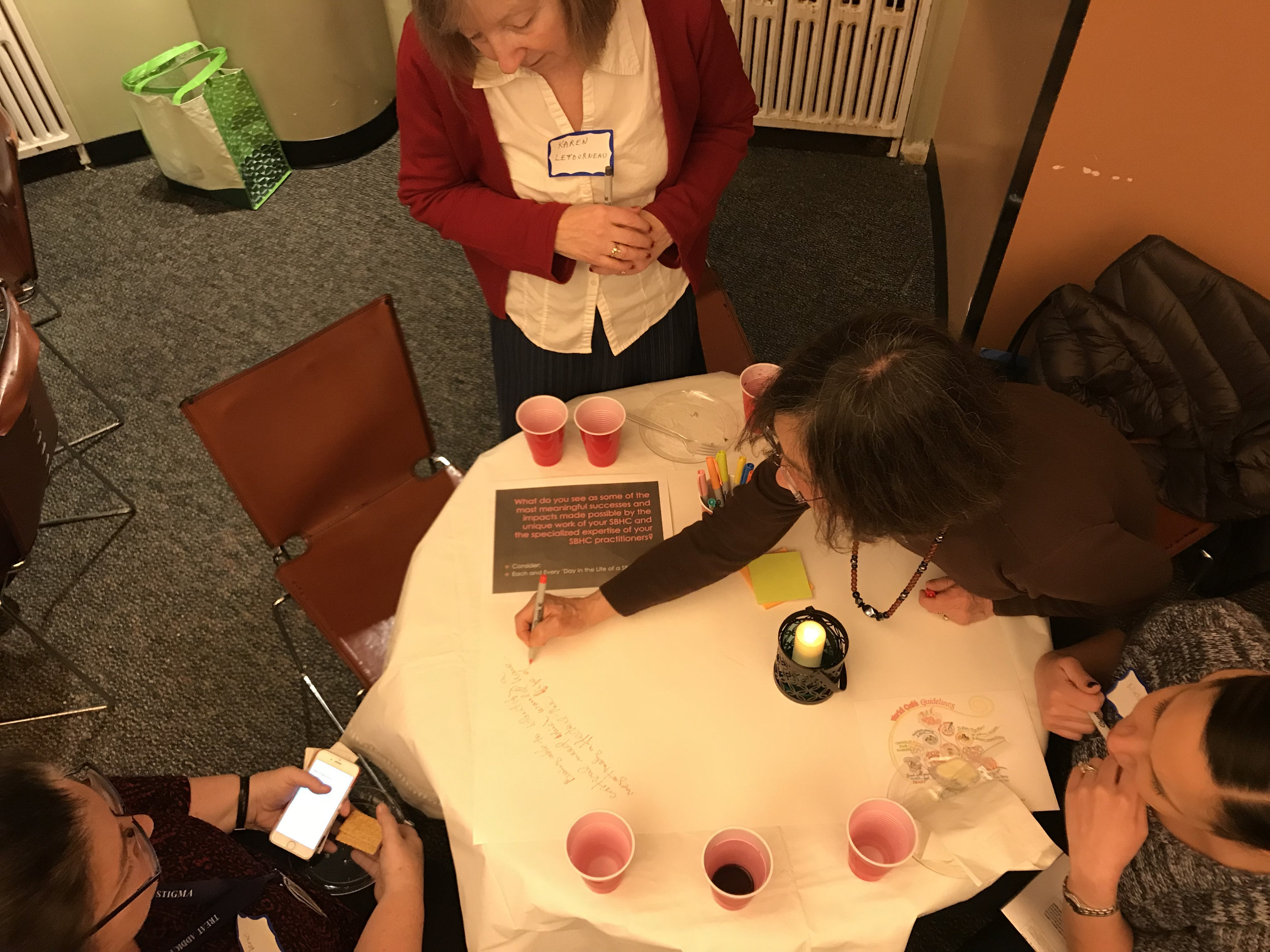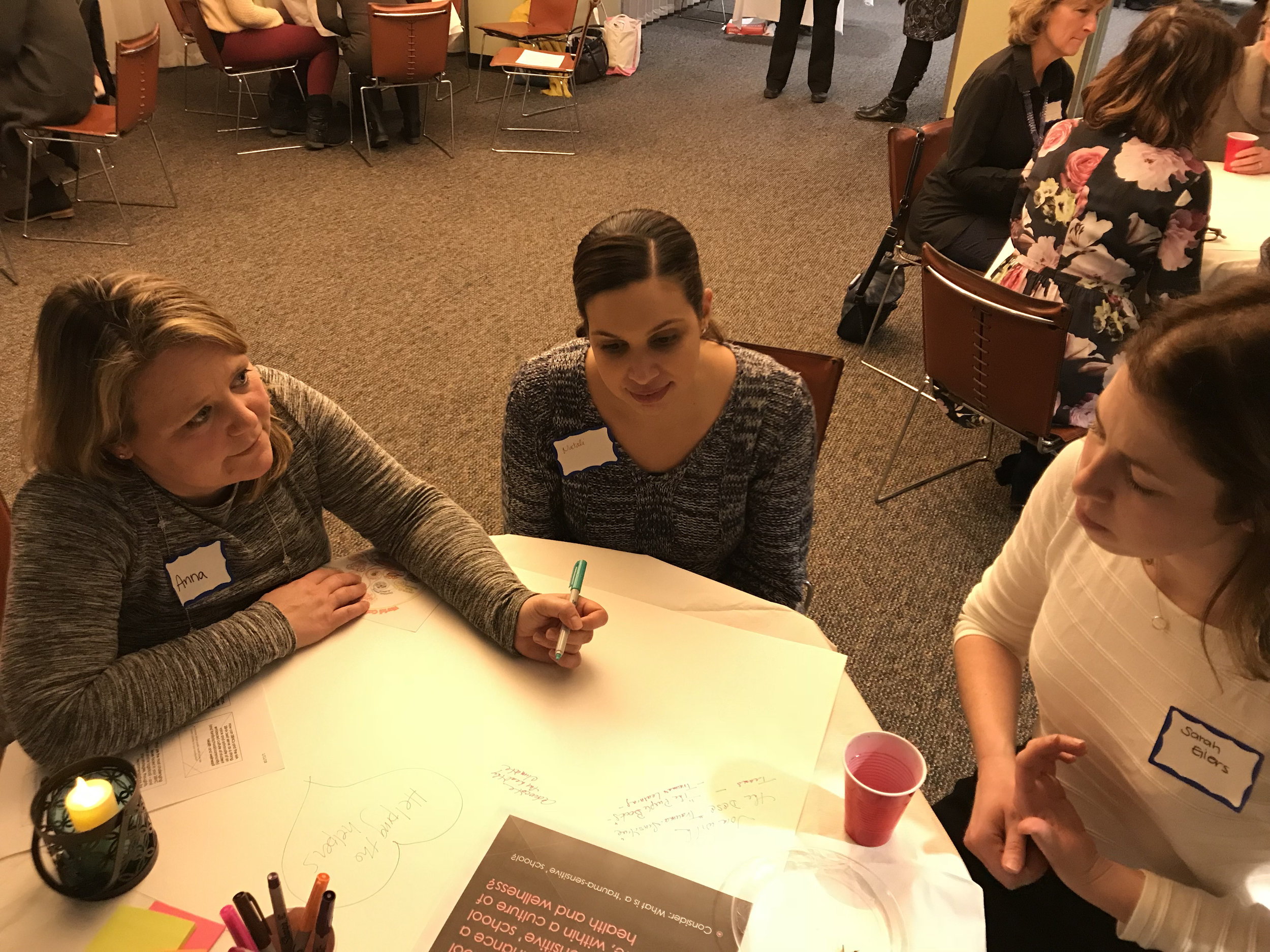Winter World Cafe 2018
On Thursday, 1/11/18, the Massachusetts School-Based Health Alliance kicked off the new year with its MA SBHA World Cafe, inviting SBHC providers from across the state to share their thoughts, expertise, and collective wisdom regarding Massachusetts SBHCs, as well as recommendations for reinforcing the SBHA mission of '... promoting the health, resiliency, and academic success of children and adolescents, in collaboration with community partners committed to advocating for student well-being through school-based health centers'. The following six questions guided and provoked much collegial conversation and diverse perspectives regarding next steps and 'best practices' - and responses are shared (in no particular order) to continue the conversation and invite others to join in. Many thanks to all who joined in this initial event and candidly shared personal reflections, recommendations, expertise, passionate advocacy, humor, and a sense of community. These responses (and any additional feedback shared with the SBHA) will guide the next steps of the alliance. Looking forward to the next MA SBHA community event!
What do you hope membership in the MA SBHC will do for you/your SBHC community?
What will make membership meaningful, collegial, useful, memorable, important, influential? What do you think the SBHA priorities should be? What are your thoughts on the mission, advocacy, best practices, collaborative partnerships, engaging others?)
- *Advocacy: locally - statewide - nationally
- Advocacy on policy/Integrate best practices - GROWTH
- Press Releases
- Identity
- EXPOSURE
- Youth Engagement
- Advocacy/'Voice' - especially related to insurance and confidentiality
- Support and a community of SBHC providers
- Share struggles with people who know what you are experiencing
- Co-creation of a peer group to prevent isolation
- Share best practices
- Place to gather; Share knowledge; Learn from each other; Let it percolate
- Membership of an organization is important - Gives it weight
- All sites included
- Would like the SBHC model to be understood, LEGITIMIZE
- Frequent events/ Needs to be active/ Need to feel pulled in
- Sharing resources
- Networking - (underlined/'agreed')
- Connect to national organization
- Add to Sustainability
- Learn how to bill better
- Share best practices
- Help with negotiating salary
- Bring together different people in different roles/professions - provide community - Need to be sure ALL roles are represented
- Connect between DPH and Non-DPH sites
IMPACT
What do you see as some of the most meaningful successes and impacts made possible by the unique work of your SBHC and the specialized expertise of your SBHC practitioners?
- Early conversations about real issues impacting kids, families
- Safety Net!
- Increase access/increased relief for parents
- SBHC clinicians = Trusted adults
- Create a safe space for students for any issue they are concerned about
- ID social needs (ex: food insecurity) - Address social determinants of health - Whole family
- Being able to identify a critical need which would have negatively affected the life of a student
- Continuity of care
- Parents don't miss work/Students don't miss instructional time
- Keep kids in school/Access school earlier because vaccines are complete
- Serving as role models for students, both academically, being healthy, healthy lifestyle, healthy relationships
- Integration of mind-body-spirit - lifestyle medicine
- Teen birth rate decreased to 0% in one of our communities
- No copay - Better access
- Being a place where students can ask anything and feel they can BE anything
- Teacher engagement
- Resilience and asset-building
- New possibilities in relationships
- Change trajectory of a young person's life
- Improved attendance - with kids knowing there is someone who 'sees' them - not invisible anymore
- Privacy and confidentiality
- Increased awareness of 'health' - within school & community: stress-reduction/chronic issues/human dimensions
- Empowering students to take control of personal health and identity
- Resilience and asset-building
What role can each SBHC play in supporting a "trauma sensitive" school climate?
- Using empowering and positive language with students
- *Provide classroom consultations with Behavioral Health clinicians with expertise
- *Offering the SBHC as a 'safe space'
- *Join with the DESE 'Trauma-Sensitive' Teams - the 'Purple Books' on Trauma and Learning
- *Offering trainings - defining trauma
- *Advocate for healthy climate
- *Helping the Helpers
- *Supporting school boundaries
- *Help identify trauma symptoms
- *Consistency
- *Having a good response when trauma comes to you
- *Knowing the climate and culture of the community you are serving
- *Helping kids to identify feelings and triggers
- *Seeing kids during free periods
- *Alternative therapies - ie: acupuncture
- *Connecting students to Behavioral Health Services
- *Build interpersonal relationships to create trust
- *Acceptance
Unlimited Resources
With unlimited resources, what would be the ideal SBHC role in your school and community?
- Health educator to do community health education
- *Psychiatry - More Mental Health
- *Another NP - I want a buddy
- *More space
- *No more copies! No more questionnaires! More clinical - Less clerical!
- *Engage Superintendent, Principals, Administrators
- *With enough time and people: participate in all school-based systemic and crisis team meetings with educators, community organizations - being a voice for 'health' (and for disenfranchised students/families)
- *SBHC in every school
- *Need support of community PCPs - Shared understanding of what we do - Physical visits
- *Dental services - Vision Services - **Nutrition Services - Acupuncture Services
- *See any patient, regardless of insurance status
- *Space/rooms in school for re-entry from psych, sensory breaks
- *Hub of holistic care (ie: acupuncture, wellness, etc.)
- *Connecting body and mind
- *Peer/Mentor
- *More welcoming/lounge-y space with supervision
- *Case manager - care coordinator - wrap-around coordinator
- *Family engagement piece
- *Legal services - Housing - Food - **Concrete Services
- *Wellness focus - prevention - stress-reduction
- *I want more time
- *Provide full reproductive health services without restriction to the level of license
- *My own MA, My own nurse, My own Medical Coordinator
- *Free me up to do what I really want
- *Work at peak of training
- *Department of Public Health, Department of Education, and school health community agree upon meeting the standards of care for all children, regardless of insurance or ability to pay, within the school - Integrating behavioral health, school counselors, academic administrators, and health providers - Have a shared vision for SBHC - All sites provide reproductive health services.
What are the most challenging issues faced in your SBHC
- With changing environment (ACO - health insurance) and need for more mental health, dental, and substance use treatment, how do we change programs and services and meet those need?
- *Struggles to meet DPH requirements for medical visits, when the need is not as critical
- *SBHCs ned to address social determinants of health in a creative, holistic way
- *Sustainability issues for SBHCs with funding in this new environment - How do we survive?
- *School communication and relationships - understanding what the health center is/does - and how to work together
- *Protocols and guidelines are dependent on Administration/Principal - How do we work together (school, SBHC, DPH) in a way that there are 'standards of care'?
- *Lack of/ need for more support staff
- *Lack of carve-out - not being allowed to serve child because clinic doesn't accept insurance
- *Getting Clinic Administrators to pay attention to SBHCs and understand that they won't make money
- *Continuity of care: 'boundaries' vs 'putting out fires'
- *Complex patients with multiple problems limits ability to affect change
- *Pressure to see more patients - Balance between seeing increased numbers and doing through job with each one - addressing all issues
- *Pressure....has always been there, but now there is more scrutiny
- *Conflicting requirements from funding and parent agencies limits productivity
- *Space...
- *Creative coding






